

 |
 |
|
 |
|
| About Us |
|
Read Past Issues | Resources | Composer Links |
|
|
|

The Shock of the Old Composer: Common Sense Composers' Collective Santa Fe New Music - #513 Consider the possibility that ancient instruments like the harpsichord, Baroque flute and so on can be used to play contemporary music as well and you have the idea behind this very fresh and appealing collaboration between the Common Sense Composers' Collective--an eight-member cooperative based in New York and San Francisco--and American Baroque, an early-music consort that makes its home in the Bay Area. Remarkable stuff that should make converts on both ends of the musical spectrum. |
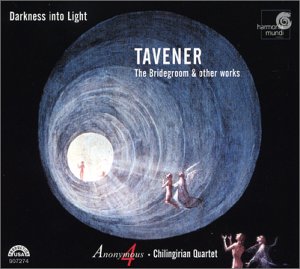
Darkness into Light Composer: Composer: John Tavener Performer: Anonymous 4 Harmonia Mundi Franc Four pieces by contemporary mystic composer John Tavener framed by medieval hymns illustrate the passage from darkness to light in this hypnotic collaboration between Anonymous 4 and the Chilingirian Quartet. The most substantial piece is the world premiere of Tavener's "The Bridgegroom," which is nearly 18 minutes long and spellbinding from start to finish.
|
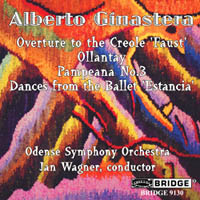
Overture to the Creole 'Faust' Ollantay, Pampeana No. 3 Dances from the Ballet, 'Estancia' Composer: Alberto Ginastera Performers: Odense Symphony Orchestra, Jan Wagner, conductor BRIDGE 9130 The nice folks at Bridge Records are obviously thinking Latin America these days with their recent fabulous Villa-Lobos release and now this superb collection of music from the great Argentine composer Alberto Ginaestera--played, as was the Villa-Lobos, by the Odense Symphony Orchestra under Jan Wagner. This is bold and flavorful music served fresh and hot--the way you like it. |
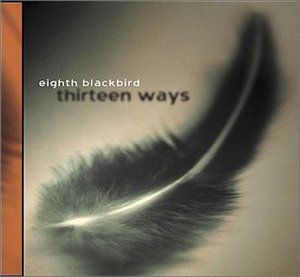
Thirteen Ways Composers: Tower, Perle, etc Performer(s): Eighth Blackbird You got to love a group that takes its name from one of Wallace Stevens' best poems but you'd love them if their name was Band X. This six-member ensemble mixes flutes, clarinets, violin and viola, cello, percussion and piano to create a big sound for chamber pieces. The composers here--Joan Tower, George Perle, David Schobar, and Thomas Albert--are all given polished and enthusiastic readings. Absolutely first-rate and highly recommended. |
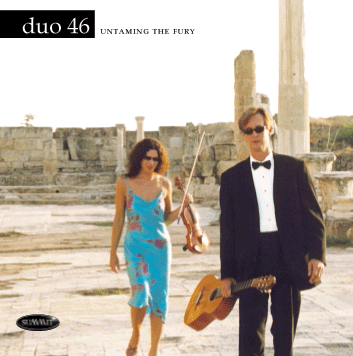
Untaming the Fury New American Music for Guitar and Violin Summit Records SMT-346 As Duo46, guitarist Matt Gould and violinist Beth Ilana Schneider make exciting music together. On this CD, they work their magic on ten pieces specially commissioned from composers who are not household names yet--but all of whom display great potential. Gould and Schneider are polished players who imbue these short works with a full-range of emotional context.
|
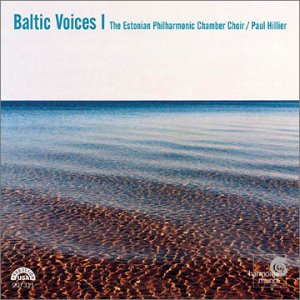
Baltic Voices 1 Composers: Arvo Pärt, Einojuhani Rautavaara, et al. Conductor: Paul Hillier Estonian Philharmonic Chamber Choir Harmonia Mundi Franc - #907311 Paul Hillier leads the Estonian Philharmonic Chamber Choir in Volume 1 of Baltic Voices — a three-year project to explore the choral riches of the Baltic Sea countries. With a special attention to the choir’s native Estonia, these recordings will highlight the mainstream tradition of the past hundred years, complemented with music of earlier periods and commissions from younger composers. Volume 1 features haunting secular and sacred works by 20th-century composers Cyrillus Kreek, Arvo Pärt, Einojuhani Rautavaara, Sven-David Sandstrøm, Peteris Vasks, and Veljo Tormis. Cool, ethereal, other worldly music from a hot bed of great contemporary composers. |

Awakening at the Inn of the Birds, etc. Composer: Michael Byron Performers: FLUX Quartet, Sarah Cahill, Joseph Kubera, and Kathy Supove Cold Blue Music CB0012 Michael Byron blends minimalist and maximalist techniques and rigorous processes with freely composed music to create works that range from the hynotic to the boisterous. Continents of City and Love and Tidal, written 20 years apart, are both arch-form pieces scored for two pianos, synthesizer, string quartet, and doublebass. This new CD collects four of Byron’s very recent works and a new recording of a piece from 1981, all performed by some of today’s most-respected new-music champions, including Sarah Cahill and Joseph Kubera on pianos, Kathleen Supové on synthesizer, and the FLUX Quartet. |
Level
7
|
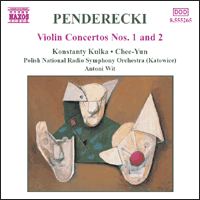
Orchestral Works 4 Composer: Krzysztof Penderecki Peformers: Chee-Yun, violin; Wit, Polish Nat'l Rso, Naxos The two violin concertos presented here are from the 1970s when Penderecki returned from strict modernism to more traditional modes of composition. The first concerto dates from 1977, and was written for Isaac Stern, its solo writing containing prodigious technical difficulties. The second is not much easier but both violinists on this CD produce lively, impressive accounts. |
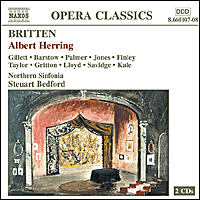
Albert Herring Composer: Benjamin Britten Performer: Bedford, Northern Sinfonia Naxos - In which young Albert Herring, the May King (apparently no female virgin could be found to serve as Queen) is taken into hand by the lovers Sid and Nancy, fortified with rum, and treated to a night on the town where he does--or does not--lose his virtue. Wonderful, gay comedy and beautifully sung. |

Complete Orchestral Works 3 Composer: John Carbon Conductor: Vladimir Valek, Marin Alsop, et al. Mmc Records - #2120 Recent recordings of Carbon's dazzling Violin Concerto, performed by Violinist Peter Zazofsky with Gerhardt Zimmermann conducting the Warsaw National Philharmonic Orchestra; also a marvelous reading by Richard Stoltzman of Carbon's Clarinet Concerto, and Notturno for Trumpet, Harp, and Strings, performed by Gerard Schwarz (with Jeff Silberschlag on trumpet) and the Seattle Symphony. Valuable recording of an unjustly neglected composer. |
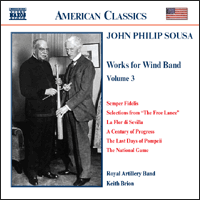
Works for Wind Band 3 Composer: John Philip Sousa Performer(s): Brion, Royal Artillery Band Naxos Born in Washington DC on 6 November, 1854, the father of American march music was the son of a trombonist with the United States Marine Band and a true prodigy. He began music lessons at age six and by the age of eleven he organized and led his own ‘quadrille orchestra’. The rest of his orchestra consisted of seven grown men and quickly became a popular dance orchestra in the Washington area. At the age of 25, he was chosen to become Director of the United States Marine Band in Washington. He began leading the Marine Band in January 1880, beginning a fabled 52 year career as a bandmaster. |
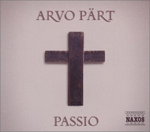 . .
Passio Composer: Arvo Part Performers: Tonus Peregrinus/Antony Pitts, director Naxos Arvo Part’s Passion of our Lord Jesus Christ according to John is widely regarded as one of the most significant choral works of the 20th century. Born in Estonia in 1935, Part studied at the Tallinn Conservatoire, his early compositions strongly influenced by Russian music from the Shostakovich era. Thirty years ago, he began to embrace polyphonic forms linked with Gregorian chant. Passio echos the earliest American minimalism, with short melodic and rhythmic patterns repeated to form a more extensive narrative. The British-based vocal ensemble, Tonus Peregrinus performs solidly. Another great bargain from Naxos |
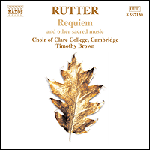
Requiem and other Sacred Music Composer: John Rutter: Performers: Choir of Clare College, Cambridge / Timothy Brown, director Naxos John
Rutter's gentle Requiem, written in 1985, was composed with a special affection
for choral sound. If you prefer the quiet requiem of Fauré to the
bombastic requiem of Verdi, you will love Rutter's work, created
from a personal selection of texts, some from the Requiem Mass and others
from the l662 Book of Common Prayer.
|
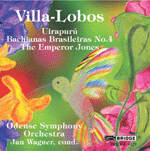
Uirapurú, Bachianas Brasileiras No. 4, The Emperor Jones (Premiere Recording) Composer: Heitor Villa-Lobos Performers: Odense Symphony Orchestra, Jan Wagner, conductor BRIDGE 9129 For
years, Villa-Lobos was regarded by many as a minor composer who wrote terrific
little pieces for the guitar. Not anymore. A veritable explosion
of recordings of orchestral works shows Villa-Lobos to have been one of
the 20th century’s giants. These vibrant performances of some of
the less recorded Villa-Lobos works are a jaw-dropping revelation of music
at its most romantic and sublime.
|
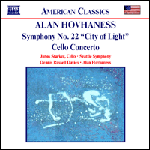
Concerto for Cello and Orchestra, Op. 17 Symphony No. 22, Op. 236, "City of Light" Composer: Alan Hovhaness Performers: Seattle Symphony Orchestra, Starker, Davis Naxos |
 |
Search WWW Search www.sequenza21.com |
